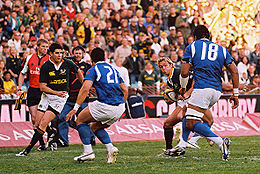Rugby union in South Africa
| Rugby union in South Africa | |
|---|---|

Springbok Percy Montgomery weaves his way towards the try-line against Samoa at the 2007 Rugby World Cup
|
|
| Country | South Africa |
| Governing body | South African Rugby Union |
| National team | South Africa |
| Nickname(s) | Springboks, Boks, Bokke |
| First played | 1862, Cape Town |
| Registered players | 651,146 (total) 121,663 (adult) 204,119 (teen) 325,364 (pre-teen) |
| Clubs | 1526 |
|
Club competitions
|
|
|
International competitions
|
|
Rugby union is a very popular team sport in South Africa, along with cricket and football, and is widely played all over the country. The National team is considered to be amongst the strongest in the world and have been ranked in the top six of the World Rugby Rankings since its inception in 2003. The country hosted and won the 1995 Rugby World Cup, and won again the 2007 tournament in France.
Given South Africa's history, as with much else in South Africa, the organisation and playing of rugby has been entangled with politics, and racial politics in particular.
When Canon George Ogilvie became headmaster of Diocesan College in Cape Town in 1861, he introduced the game of football, as played at Winchester College. This version of football, which included handling of the ball, is seen as the beginnings of rugby in South Africa. Soon, the young gentlemen of Cape Town joined in and the first match in South Africa took place between the "Officers of the Army" and the "Gentlemen of the Civil Service" at Green Point in Cape Town on 23 August 1862 and ended as a 0-0 draw. The local press reported a series of football matches between scratch sides "Town v Suburbs" or "Home v Colonial-born".
Around 1875, rugby began to be played in the Cape colony; the same year the first rugby (as opposed to Winchester football) club, Hamilton, was formed in Sea Point, Cape Town. Former England international William Henry Milton arrived in Cape Town in 1878. He joined the Villagers club and started playing and preaching rugby. By the end of that year Cape Town had all but abandoned the Winchester game in favour of rugby. British colonists helped spread the game through the Eastern Cape, Natal and along the gold and diamond routes to Kimberley and Johannesburg. British troops would also play a key role in spreading the game throughout the country.
...
Wikipedia
